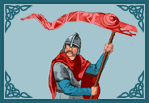 |
 |
||||||||||||||||||||||||||||||||||||||||||||||
|
|
Vortigern was known as Gwrtheyrn Gwrtheneu (the Thin) by the Welsh. Vortigern could be a mere title meaning 'Over-King'. John Morris suggests that, like his supposed forebears, his real name was Gwidol (Vitalis) or Gwidolin (Vitalinus), the names of his father and grandfather respectively. However, it is now generally accepted that Vortigern was his birth name. His exact origins are obscure. Vortigern's power-base was always the area that now spans the Welsh border: his eldest son founded the kingdom of Gwent and another set up a thriving domain in Powys, just to the north. Vortigern himself appears to have held sway in nearby Gloucester in his early years. His great grandfather, as attested by Nennius and the Jesus College MS.20, is said to have been Gloyw Gwallthir (Long-Hair), one of the city's supposed founders, though more likely a decurion of that place. His name may well be synonymous with the place itself: "Gloucester Long-Wall," though some think the appendage to his name indicates he was a long-haired Pict. The ancestry is extended back through several generations in the "Life of St. Gurthiern," his cousin:
This pedigree has some impossible ancestors, such as Vortigern's enemy, Ambrosius, and his father-in-law, Maximus. There are, however, also more typical ancestral claims, like the descent from the Celtic God, Belenos alias Beli Mawr, and late Roman Emperors: all very much jumbled. The "Life of St. Beuno" gives the alternative line:
Here, Gwidol, Gwidolin and Gloyw are not mentioned. Celtic ancestral gods, Afallach, Belenos & Anu appear in the traditional earliest generations. Later generations appear to be confused with the traditional line of Coel Hen, though it seems unlikely that these two men were closely related. It is, however, noteworthy that the descent from Eudaf Hen persists and this may represent a genuine tradition. Even though this man himself belongs to the realms of semi-mythology, he did supposedly rule in the Gwent/Gloucester region. Eudaf's male heir was his nephew, Conan Meriadoc. Perhaps Gloyw was a younger brother. Alternatively, Eudegern/Eudegan and Deheuwynt may be a confused memory of Eudaf's supposed son and grandson, Eudaf II and Dionad, mentioned by Boece. Vortigern's family traditionally continues thus: Vortigern Vorteneu
(the Thin), High-King of Britain, Abt 370 - Abt 459
m. Rowena of Kent, Abt 405 -
|
||||||||||||||||||||||||||||||||||||||||||||||
| © Nash Ford Publishing 2001. All Rights Reserved. | |||||||||||||||||||||||||||||||||||||||||||||||


